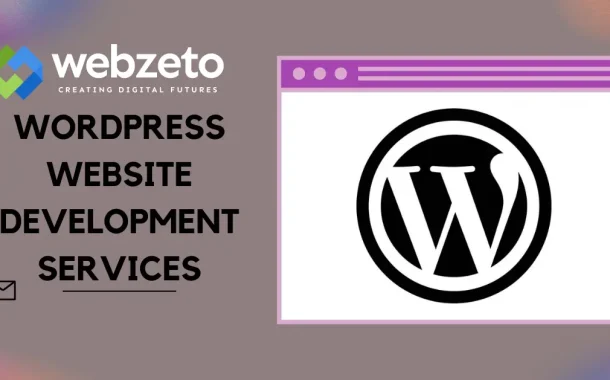Professional website development ensures your site meets specific needs and goals with expert design, coding, and optimization. It enhances brand image, improves user experience, and drives traffic and conversions. Professionally developed sites are compatible across devices, improve search engine rankings, and offer ongoing support.
Table of Contents
Table of Contents
Components of WordPress Website Development
These components are essential for creating and maintaining a successful WordPress website that meets your needs and goals.
- Domain Registration and Hosting: Registering a unique domain name that reflects your brand or business. Selecting a reliable hosting provider to ensure your website is accessible to users. Configuring domain settings and linking your domain to your hosting account.
- Themes and Templates: Choosing a suitable WordPress theme that aligns with your website’s purpose and aesthetics. Customizing the theme to match your brand identity through color schemes, fonts, and layout modifications. Exploring premium themes or hiring a developer for custom theme design for unique branding.
- Plugins and Extensions: Installing essential WordPress plugins to add functionality such as SEO optimization, contact forms, and social media integration. Evaluating plugin compatibility and performance to ensure they enhance rather than hinder website performance. Customizing and configuring plugins to meet specific requirements and user needs.
- Content Management: Creating and organizing content using WordPress’s intuitive editor, including posts, pages, and multimedia elements. Implementing content strategies for SEO, user engagement, and conversion optimization. Utilizing categories, tags, and custom taxonomies for efficient content organization and navigation.
- Security Features: Implementing robust security measures to protect against hacking attempts, malware, and data breaches. Installing security plugins for features like firewall protection, malware scanning, and login security, regularly updating WordPress core, themes, and plugins to patch security vulnerabilities.
- SEO Tools and Optimization: Optimizing on-page elements such as meta titles, descriptions, and headings for search engine visibility. Integrating SEO plugins for advanced features like XML sitemaps, schema markup, and canonical URLs. Conducting keyword research and optimizing content for target keywords to improve search engine rankings.
Choosing the Right WordPress Development Service
Choosing the right WordPress development service requires thorough research and careful consideration of your requirements.
- Assessing Your Needs: Determine your website’s objectives, features, and budget requirements. Identify whether you need custom development, theme customization, or plugin integration.
- Research and Reviews: Explore WordPress development agencies and freelancers through online searches, directories, and referrals. Read reviews, testimonials, and case studies to gauge the quality of their work and client satisfaction.
- Portfolio Evaluation: Review the portfolio of potential service providers to assess their expertise and experience. Look for projects similar to yours and evaluate their design quality, functionality, and user experience.
- Technical Expertise: Ensure the developers have proficient knowledge of WordPress, PHP, HTML, CSS, and JavaScript. Inquire about their experience with responsive design, SEO best practices, and security protocols.
- Communication and Collaboration: Assess their communication channels and responsiveness to inquiries, concerns, and project updates. Determine their willingness to collaborate, understand your vision, and offer creative solutions.
- Support and Maintenance: Inquire about post-launch support, maintenance plans, and update schedules. Ensure they provide ongoing technical support, troubleshooting, and security monitoring.
Types of WordPress Development Services
These WordPress development services cater to diverse needs and objectives, offering businesses and individuals the flexibility to create, customize, and manage their websites.
1. Custom WordPress Development
Tailored solutions for specific business needs. Custom themes and plugins developed from scratch. Integration of unique functionalities and features. Responsive design tailored to client requirements. Ongoing support and maintenance for customized solutions.
2. Theme Development and Customization
Creation of bespoke WordPress themes. Customization of existing themes to match branding. Responsive design adjustments for various devices. Optimization for speed and performance. Implementation of design revisions based on client feedback.
3. Plugin Development
Creation of custom plugins for unique requirements. Integration of third-party plugins with customization. Performance optimization and code efficiency. Compatibility testing with WordPress updates. Documentation and support for plugin usage.
4. WooCommerce Development
Setup and customization of WooCommerce stores. Integration of payment gateways and shipping options. Customization of product pages and checkout process. Implementation of sales and discount features. Optimization for search engine visibility and conversion rates.
5. Website Migration Services
Transfer of websites from other platforms to WordPress. Migration of content, images, and database seamlessly. Preservation of SEO value and URL redirection. Testing and verification of migrated content. Post-migration support and troubleshooting.
6. SEO and Performance Optimization
Implementation of SEO best practices for content and structure. Optimization of page speed and loading times. Configuration of caching and content delivery networks (CDNs). Mobile optimization for improved search rankings. Monitoring and reporting on website performance metrics.
7. Website Maintenance and Support
Regular updates of WordPress core, themes, and plugins. Security monitoring and malware removal. Backup and disaster recovery setup. Technical support for troubleshooting and issue resolution. Performance optimization and website health checks.
8. Content Management and Blog Setup
Setup and configuration of WordPress for blogging. Customization of blog layout and post formats. Training on content creation and management. Integration of social sharing and commenting features. Optimization for search engine visibility of blog content.
9. Responsive Design and Mobile Optimization
Development of responsive designs for all devices. Optimization of user experience on mobile devices. Testing across various screen sizes and resolutions. Implementation of mobile-specific features and interactions. Improvement of mobile page speed and performance.
10. Multisite Development
Setup and configuration of WordPress Multisite networks. Management of multiple websites from a single installation. Customization of network-wide themes and plugins. User management and permissions for individual sites. Optimization and scalability for large-scale multisite networks.
The Development Process
This development process ensures a systematic approach to building WordPress websites, from initial planning and design to deployment, launch, and ongoing support.
1. Discovery and Planning
Initial consultation to understand client goals. Analysis of target audience and competitors. Creation of project scope, timeline, and budget. Development of project roadmap and wireframes. Identification of key stakeholders and decision-makers. Alignment of project objectives with business goals.
2. Design Phase
Creation of mockups and prototypes. Selection of color schemes and typography. Incorporation of visual elements and branding. Iterative design revisions based on feedback. Finalization of design elements and approval. Preparation of design assets for development.
3. Development Phase
Setup of WordPress environment and configuration. Conversion of designs into HTML/CSS templates. Integration of custom functionalities and plugins. Implementation of responsive design principles. Regular testing and debugging of code. Compliance with web standards and best practices.
4. Content Creation and Integration
Creation or migration of website content. Optimization of content for search engines. Integration of content into WordPress CMS. Formatting and styling of content elements. Testing content layout and formatting. Provision of training for content management.
5. Testing and Quality Assurance
Comprehensive testing of website functionality. Usability testing for intuitive navigation. Cross-browser compatibility testing. Performance testing for speed and responsiveness. Debugging and resolution of issues. Client review and approval of website.
6. Deployment and Launch
Migration of website to live server. Configuration of domain settings and DNS. Implementation of security measures. Final testing and validation of live website. Launch announcement and promotion. Monitoring of website performance post-launch.
Common Challenges in WordPress Development
- Security Vulnerabilities: Protecting against hacking attempts and malware infections. Regularly updating WordPress core, themes, and plugins. Implementing security measures such as firewalls and security plugins. Conducting security audits and vulnerability assessments.
- Plugin Compatibility Issues: Ensuring compatibility between plugins and WordPress core. Resolving conflicts between multiple plugins. Testing plugins thoroughly before installation. Choosing reputable plugins with active development and support.
- Performance Optimization: Improving website speed and performance. Minimizing HTTP requests and optimizing images. Implementing caching mechanisms and content delivery networks (CDNs). Optimizing database queries and server response times.
- Responsive Design Challenges: Ensuring consistent user experience across different devices. Addressing layout and formatting issues on mobile devices. Testing responsiveness on various screen sizes and resolutions. Optimizing images and media for mobile viewing.
- SEO and Content Management: Optimizing website content for search engines. Managing metadata, permalinks, and XML sitemaps. Addressing duplicate content issues and canonicalization. Integrating SEO plugins and monitoring search engine rankings.
- Theme Customization Limitations: Customizing themes to match specific design requirements. Dealing with limitations imposed by pre-built themes. Balancing customization needs with theme updates and compatibility.
- Scalability and Performance: Ensuring the website can handle increased traffic and user interactions. Optimizing code and database queries for scalability. Implementing caching and load balancing for high-traffic websites. Monitoring server resources and upgrading infrastructure as needed.
Future Trends in WordPress Development
WordPress development is expected to see some exciting changes. First up, we have “Headless WordPress”. This means separating the content management system from the way it’s presented on the website. It allows for more flexibility in how content is displayed, making it easier to use WordPress for different platforms like mobile apps or smart devices.
Another big thing on the horizon is the use of artificial intelligence (AI). This could mean things like AI-powered content creation, where computers help write articles or product descriptions. Plus, we might see more chatbots and virtual assistants helping out with customer service on WordPress websites.
And let’s not forget about Voice Search Optimization. With more people using voice assistants like Siri or Alexa, websites need to be ready to answer voice-based queries. This means structuring content in a way that’s easy for computers to understand and optimizing for spoken searches.
FAQs
Q. What are the benefits of hiring a professional WordPress developer?
Professional developers have the expertise to create a website tailored to your needs. They ensure your website is secure, performs well, and is optimized for search engines. Hiring a professional saves you time and ensures a high-quality result.
Q. How long does it take to develop a WordPress website?
The time to develop a website varies depending on its complexity and features. Simple websites can be built in a few weeks, while larger projects may take several months.
Q. Can I update my WordPress website myself after it’s developed?
Yes, WordPress comes with an easy-to-use content management system (CMS). You can update content, add new pages, and upload media without technical knowledge.
Q. Do I need to purchase a domain and hosting for my WordPress website?
Yes, a domain is your website’s address, and hosting is where your website’s files are stored. Many hosting providers offer WordPress-specific hosting plans for easy setup.
Q. What ongoing maintenance does a WordPress website require?
Regular updates to WordPress core, themes, and plugins are essential for security and performance. Backing up your website regularly and monitoring for security threats are also important tasks.
Conclusion
WordPress website development services offer a versatile and powerful platform for creating websites that meet your specific needs and goals. With its user-friendly interface, extensive customization options, and vast library of themes and plugins, WordPress enables businesses and individuals to establish a strong online presence quickly and efficiently. WordPress can be tailored to suit your requirements, whether you need a simple blog, an e-commerce store, or a complex business website.
By investing in professional WordPress development services, you can ensure that your website is built to industry standards, optimized for performance and security, and designed to engage your target audience effectively. With ongoing support and maintenance, you can keep your website running smoothly and adapt to changing business needs over time.














